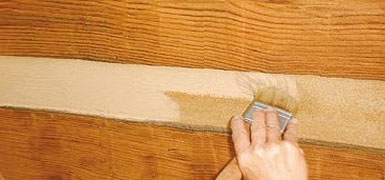Apply Pre-Mixed Chink Paint:

Chink-Paint is an elastomeric, textured coating for renewing or changing the color of chinking. Ideal for giving your log home a face-lift by brightening the appearance of old, dirty chinking, or altering the color of existing chinking. Chink-Paint’s elasticity enables it to expand and contract with Perma-Chink chinking or Energy Seal without cracking or peeling. When restoring an older home, it saves time and money by eliminating the need to mask off the chinking before staining. Simply wait for the stain to dry and then apply a coat of Chink-Paint in the color you desire.
Make Your Own Paint-On Chinking:
As explained by Sashco, "It’s easy to make your own Log Jam® chink paint on site. And since mixing your own costs 1/3 less than buying pre-mixed chink paint, it’s the smart money-saving choice.
Simply follow the instructions below, then apply over any water-based chinking*.
PREPARATION:
Be sure that all chink lines are clean and dry, and free of waxes, mold, mildew, dust, pollen, and other contaminants.
MIXING INSTRUCTIONS:
Large Volume (Yield: approx. 5 gal. mixed)
1) Remove and set aside 1 gallon of chinking from a 5 gallon pail.
2) Add one gallon of distilled water back into the pail.
3) Using a high viscosity mixing blade, thoroughly mix the water and chinking.
4) Add additional water or chinking (in small increments) to “dial in” your preferred viscosity.
Small Volume (Yield: approx. 1 quart mixed)
1) Gun out entire contents of one 29 oz. cartridge of chinking into any large plastic container (such as a clean 1 gal. ice cream bucket).
2) Add in ½ pint (8 oz.) of distilled water
3) Using a mixing blade or a typical kitchen hand-held mixer, thoroughly mix the water and chinking.
4) Add additional water or chinking (in small increments) to “dial in” your preferred viscosity.
Floetrol®, a common additive used in the paint industry, can be used in place of water, if desired. Resulting mixture will not be noticeably different. (Floetrol® is a registered trademark of the Akzo Nobel group of companies.)
APPLICATION INSTRUCTIONS:
1) Using a foam paint brush, paint pad or trowel (whichever you prefer), apply the chink paint and smooth onto the chink line.
2) Clean off any drips or runs immediately so they don’t dry on the wood and stain it.
3) Allow to thoroughly dry. Cover exterior walls with plastic if rainfall is expected within 24 hours after installation.
COVERAGE RATES:
Joint Width: 3/4” 1” 1-1/2” 2” 3”
Lineal Feet per 1 gal.: 1760 1320 880 660 440
*Tested for compatibility with Sashco’s Log Jam chinking. Always test first if using a different product.


